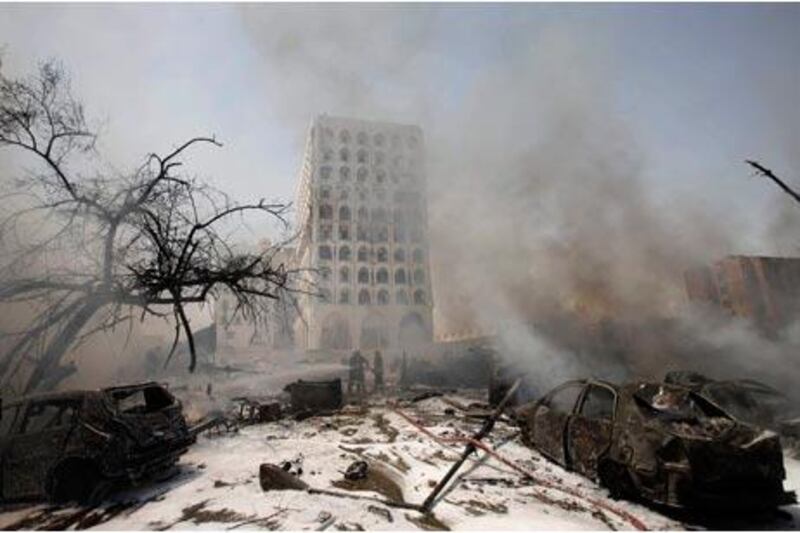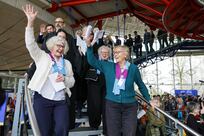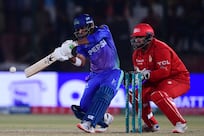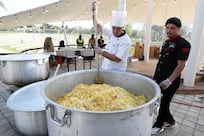DAMASCUS // Syrian officials have held a series of recent meetings with leading Iraqi political figures, in an apparent attempt to isolate Iraq's prime minister, Nouri al Maliki, and bypass allegations of involvement in Baghdad bombings.
Formal relations between Syria and Iraq have been growing steadily worse since August, when Mr al Maliki publicly accused Syrian-based militants of carrying out devastating attacks in the Iraqi capital. He immediately recalled Iraq's ambassador in protest, a move that took Syria, Iraqi politicians and western diplomats by surprise. Just one day before the August 19 bombings, Mr al Maliki and Bashar al Assad, the Syrian president, had agreed to enter a strategic cooperation deal that was of significant long-term importance to Syria's economy.
The sudden turnaround in the relationship was followed by a rapid deterioration. Iraq's security forces claimed Syrian involvement in a series of subsequent attacks that cost hundreds of lives, and that left the proposed Syria-Iraq strategic partnership in tatters. Although there has been no rapprochement between Mr al Maliki and Mr Assad, or formally between the two governments, Syria has been reinforcing its ties to powerful mainstream factions from across Iraq's political spectrum. These steps may give Damascus a chance to outmanoeuvre the Iraqi prime minister and resurrect its hopes for economic cooperation.
This month, Ammar al Hakim, head of the Islamic Supreme Council of Iraq (ISCI), visited Syria, ostensibly to give his condolences to Mr Assad after the death of his younger brother. Rather than being an apolitical trip however, Mr al Hakim pointedly conveyed "deep appreciation" for Syria's role in supporting Iraq, a marked contrast to Mr al Maliki's insistence that Damascus was sheltering terrorists. ISCI and Mr al Maliki's Dawa Party have long enjoyed close relations, but are competing against each other in the forthcoming Iraqi elections.
Mr al Hakim's comments were taken as a signal that ISCI did not believe Syria was involved in the bombings and that the Iraqi prime minister's allegations were, in fact, politically motivated. Mr al Maliki has staked his reputation on improved security, a claim weakened by a rise in violence that threatens his re-election prospects. The Iraqi prime minister's political opponents have accused him of blaming Syria in an effort to deflect criticism over his own failures. That ISCI, an ally of Mr al Maliki and Iran, seems to share that view has made the Iraqi leader's position look increasingly isolated.
That apparent isolation was further underlined a few days after Mr al Hakim's visit, when the former Iraqi prime minister, Ayad Allawi, arrived in Damascus for a meeting with the Syrian president. Mr Allawi, a leading Iraqi secular figure with close ties to the United States, is expected to be a major player in the upcoming elections. His Iraqiyya coalition includes Saleh al Mutlaq, a leading Sunni figure, and Tareq al Hashemi, one of two vice presidents.
The series of visits - Mr al Hashemi was in Damascus on Friday - mean Syria can boast of close links to pro-Iranian Shiite factions, in the form of ISCI, to pro-US secularists, in the form of Mr Allawi, and, in Mr al Hashemi, Sunni figureheads. In fact, most Iraqi factions maintain political offices in Syria, including Shiite hardliners and, at the opposite extreme, Iraqi Baathists, who fled their country following the overthrow of Saddam Hussein's regime. It has been their presence that ostensibly angered Mr al Maliki.
Syria's current good relations with Iraq's various players - barring Mr al Maliki's own Dawa party - have not produced any immediate dividend in terms of renewing severed Baghdad-Damascus cooperation. But Syria appears to be betting on these relationships putting it in a strong position after the next elections in Iraq, whatever their outcome. Mr al Maliki may win enough votes to retain his seat as prime minister. Iraq's complex political system, however, makes it almost certain that he will have to form a coalition government. And there is every likelihood that will require him entering into an alliance with one of the groups that Syria has been courting, including the Iraqiyya bloc or ISCI.
Under those circumstances, Syria does not have to depend on Mr al Maliki losing the March ballot to see relations with Baghdad improve. Damascus will already have sewn up deals with the various parties Mr al Maliki himself depends on and, therefore, will be well placed to exert pro-Syria pressure on the new prime minister's policy. After years of insecurity and struggle following the US-led invasion - in which Damascus was widely accused of playing a spoiling role - Syria was eagerly anticipating closer ties with Baghdad. In particular it was hoping to conclude those lucrative gas and oil deals with its wealthier neighbour.
Those hopes were threatened by the sudden fallout with Mr al Maliki. Yet it appears that Syria, long renowned as a wily player on the regional political scene, has been quietly hedging its bets. Now, however the cards fall in Iraq's elections - and even if an anti-Syrian Mr al Maliki wins - Damascus feels it will have a better-than-even chance of manoeuvring Baghdad back onto its side. Email:psands@thenational.ae






